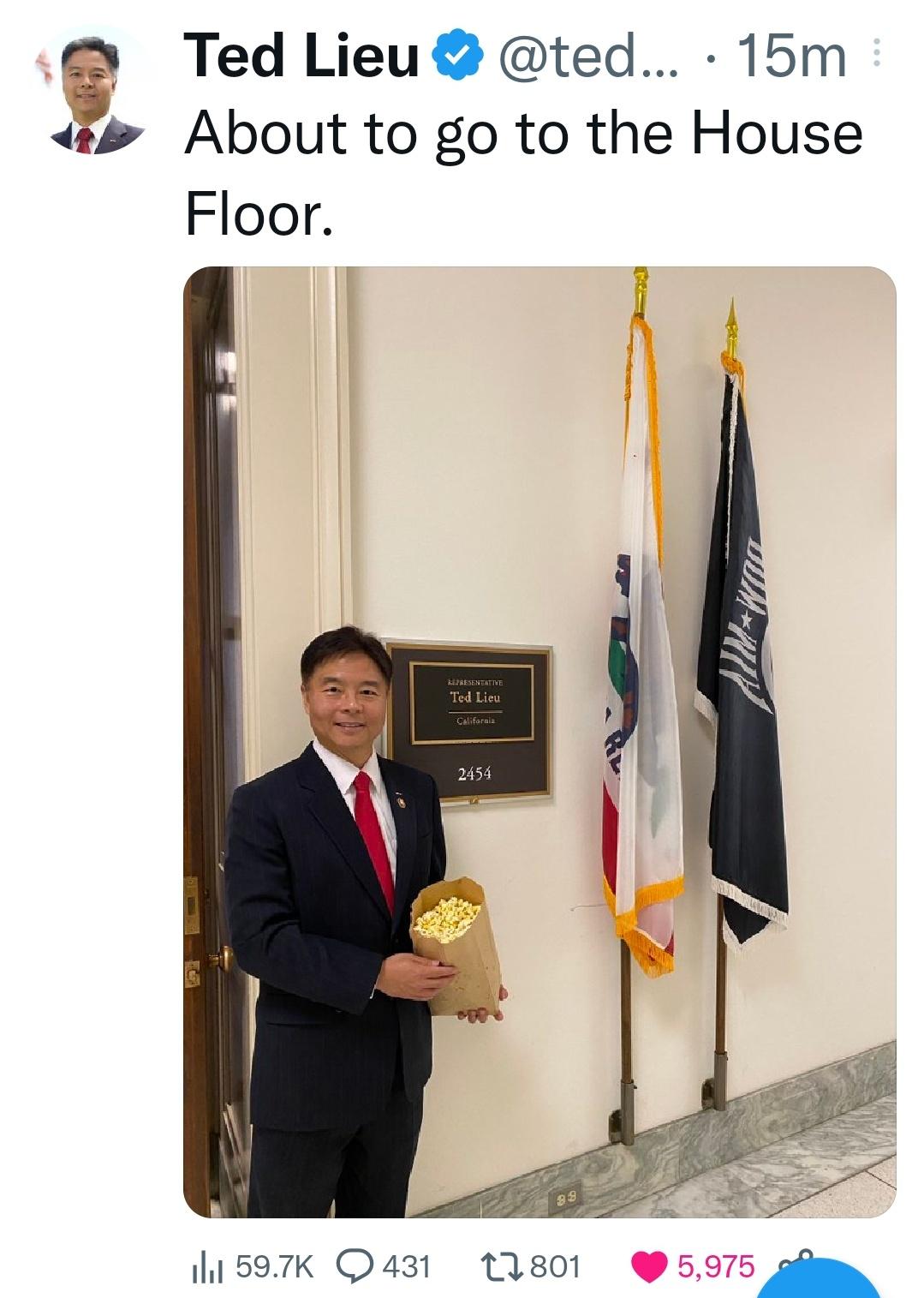Comments
GELFAND’S WORLD - Answer: So far, 54 million aren't enough.
There is a real problem in trying to write a political comment with a deadline of Thursday afternoon. In the one possibility, the Republicans will continue to hold votes long into the day and won't be able to elect a Speaker. In the other case, the Republicans make some devil's brew of a bargain to pay off the farthest right of the far right (Gaetz and Jordan are to be among the leaders of the American people!) in order to endow a crippled Speaker with his own manacles. Right now it looks like the Republicans will be dragging this out for at least another day or two. Maybe it will go into next week.
Kevin Drum has been having a fine old time enjoying watching McCarthy being humiliated time and time again. (Up to six as of Wednesday and an eighth time as we approach the noon hour of Thursday out here.)
Here's a riddle for high school civics classes: At this moment, who is second in line to assume the presidency should Joe Biden and Vice President Harris suddenly be unable to perform the duties through death or disability? (You can find the answer at the bottom.)
An amusement: Wednesday at 8 PM EST: On an adjournment vote, McCarthy managed to scrounge up an additional 15 votes from his detractors who were willing to vote in favor of getting a night's sleep. 214 representatives, including a lot of Democrats, weren't even willing to go that far.
Let's take one moment to discuss a serious issue that many Americans would find confusing if they ever bothered to think about it. It's the problem of having a Rules Committee in the House and what it does.
In your clubs and neighborhood councils or your City Council, any voting member theoretically has the right to offer an amendment to any bill -- either committee members during the committee process or on the floor of the organization during final debate. In the House of Representatives, by long practice, each and any bill can be loaded down with its own rules package by the Rules Committee. In this way, the rules might allow a total of two hours of debate, with an hour apportioned to the pro-faction and an hour apportioned to the anti's. It's a way of dealing with obstructionist factions and with the minority party in a chamber where more than 400 elected members have the right to vote. Unlike the Senate, with it's rules allowing unlimited debate (the filibuster), the House is willing to limit debate on almost everything. Hence the Rules Committee. The reason this is of interest to the anti-McCarthy Republicans is that they have been feeling slighted in not being allowed to present their obstructionist amendments on the House Floor. They want a guarantee that the House will be run more or less the way the rest of us run our clubs under Roberts Rules. Of course in a system where the political party in the majority makes its decisions in its own private caucus meeting (as long as it is able to maintain discipline in floor votes), the use of the Rules Committee process speeds things up.
The voting drags on. As of this writing, the House is repeating its nominations for another floor vote. Right now, I don't see anybody all that upset with either party because the stakes aren't that high. But when the budget and the debt ceiling come due, or there is a need to appropriate funds for the next hurricane or earthquake or series of tornados, then it will be important.
The Crux of the Matter as described by Jonathan Chait
Jonathan Chait (and ably quoted by Scott Lemieux in Lawyers Guns & Money) suggests an explanation that I will paraphrase briefly: There is no ideological difference between the pro-McCarthy and anti-McCarthy groups in the Republican Party. The anti-McCarthy faction wants to go back to the days of Newt Gingrich, where the one-house Republicans will determine the policy of the United States by force of will in the House of Representatives -- they figure they can do this by bringing the government to a halt through the debt ceiling debate as they have done before, or by whatever other means they can concoct.
Here are a couple of paragraphs from Chait that explain nicely, even if it is hard to believe that people still can think this way after so many government shutdowns:
"The important thing to understand is that there is no ideological disagreement here. What McCarthy’s critics believe — in a rare iteration of Murc’s Law that admits some Republican agency — is that the right Republican House leadership would force a Democratic president and Senate to enact an extremely unpopular and radical Republican agenda"
and further…
"Republican voters, by contrast, expect and demand that the conservative agenda be advanced even — perhaps especially — under Democratic presidents. The Republican caucus is routinely gripped by frenzied efforts to compel Democratic presidents to roll back the welfare state. Newt Gingrich shut down the government to pressure Bill Clinton to sign a capital-gains tax cut and reductions to Medicaid and Medicare. Republicans used both shutdowns and the debt ceiling to try to blackmail Barack Obama into repealing his signature health-care plan."
I think the Democrats have learned how to deal with such tactics over the years.

But apparently the anti-McCarthy faction doesn't trust Kevin to be sufficiently sleezy. Perhaps they fear that he will cooperate with the Senate and the President in allowing legislation to go through. You know, the transportation bill or something like that.
Answer to the riddle: The President Pro Tem of the U.S. Senate, the senator from the state of Washington, Patty Murray. (bet you didn't guess that one). And it's true that the Speaker of the House would be the second in line if there were one.
(Bob Gelfand writes on science, culture, and politics for CityWatch. He can be reached at [email protected])





